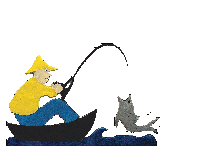

The bait is in the water and Fisherman Pete is waiting for a strike. He's been trolling Alaskan waters for nearly 100 years. A plate full of lutefisk and lefse, with a strong cup of coffee served black, is all it takes to get him started.
October 4, 2021
The Assumption that We will Act in our own Best Interest

This idea is central to many basic working theories that we use to understand how our world works. People are expected to make decisions that benefit them. That if one set of condition is true then it will lead to another. A then B. The assumption is that people will move away from pain and toward pleasure. It’s very basic. Skinner and Pavlov showed that animals behaved according to these principals.Humans are animals, why don’t we always behave in our best interest?
Part of our problem is that we do not suffer direct consequences and that leads to a disconnect, a disconnect between actions and consequence. It is this gap that can be exploited , and recently been evident in recent dislocations. This gap in logic can be misdirected, minimized, or exploited by false information and false rhetoric that can purposely obscure one’s own best interest. Here are some examples of where one would expect that people would act in one way, but do not, and it’s consequence.
My first example is Donald Trump. Why would a self-serving billionaire playboy from New York City become the choice for president of poor rural farmers and others that would seemingly have nothing in common with him. This gap was and is still not understood. As Donald Trump gained power to the disbelief of people who could clearly see that he stood only for himself, the mystery of why people were not acting in accord to their own best interest would lead them to underestimate the growing threat to democracy. People acting in their own interests is the basic principal behind capitalism and democracy. They are both threatened by people not acting in their own best interest.
My second example is the coronavirus. The assumption was that everyone would want to be inoculated against the virus and that all we had to do was develop it and get it out the door. It was assumed that people would weight the benefits and risk and make a decision that would easily come down on the side of inoculation. How wrong it was. Rhetoric clouded the science and as a community we have failed to defeat the virus.
My third example is climate change. It is very clear that our planet is changing very rapidly and uncontrollably. It is also very clear that it is changing because of human activity. How can 7 billion humans not affect the planet? This one is the scariest of issues. We only get one planet and if we blow it we have to live on it and in it. How can that not be understood?
My conclusion is that based on the first two examples, we do not have the ability to bridge the gap on climate change. It is no wonder that it us the number one concern of young people. We need to change our thinking in so many ways. If we don’t we will fail as a species. It’s that simple. Do not let that result fade from this reality. A will lead to B. Getting a clear understanding of climate change and realizing that it is nothing short of life and death will be part of the message for those who can clearly see.